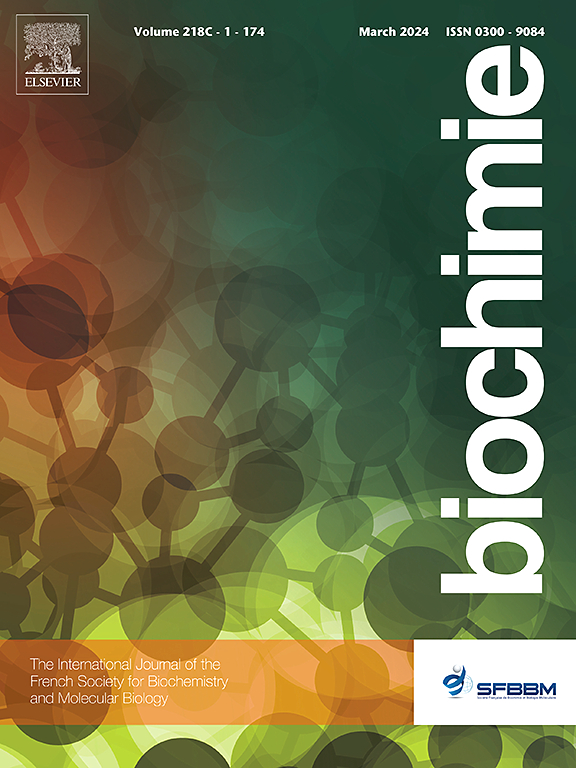Analysis of the relationship between resistin with prognosis, cell migration, and p38 and ERK1/2 activation in breast cancer
IF 3
3区 生物学
Q2 BIOCHEMISTRY & MOLECULAR BIOLOGY
引用次数: 0
Abstract
Obesity increases the risk and mortality of breast cancer through dysregulated secretion of proinflammatory cytokines and tumor adipokines that induce an inflammatory breast microenvironment. Resistin is an adipokine secreted by adipocytes, immune cells, and predominantly macrophages, which contributes to cancer progression, but its molecular mechanism in cancer is not completely described. In this study, we analyzed the relationship of resistin on breast cancer prognosis and tumor progression and the effect in vitro of resistin on p38 and ERK1/2 activation in breast cancer cell lines. By bioinformatic analysis, we found that resistin is overexpressed in the basal subtype triple-negative breast cancer and is related to poor prognosis. In addition, we demonstrated a positive correlation between RETN and MAPK3 expression in basal triple-negative breast cancer. Importantly, we found amplifications of the RETN gene in at least 20 % of metastatic samples from patients with breast cancer. Most samples with RETN amplifications metastasized to bone and showed high expression of IL-8 (CXCL8) and IL-6 (IL6). Finally, resistin could be considered a prognostic marker for basal triple-negative breast cancer, and we also proposed the possibility that resistin-induced cell migration involves the activation of MAPK in breast cancer cells.

电阻素与乳腺癌预后、细胞迁移以及 p38 和 ERK1/2 激活之间的关系分析。
肥胖会导致促炎细胞因子和肿瘤脂肪因子分泌失调,诱发炎性乳腺微环境,从而增加罹患乳腺癌的风险和死亡率。Resistin 是一种由脂肪细胞、免疫细胞(主要是巨噬细胞)分泌的脂肪因子,它有助于癌症的进展,但其在癌症中的分子机制尚未完全阐明。本研究分析了抗脂素与乳腺癌预后和肿瘤进展的关系,以及抗脂素在体外对乳腺癌细胞系中 p38 和 ERK1/2 活化的影响。通过生物信息学分析,我们发现抵抗素在基底亚型三阴性乳腺癌中过表达,并与不良预后有关。此外,我们还发现在基底型三阴性乳腺癌中,RETN 和 MAPK3 的表达呈正相关。重要的是,我们在至少 20% 的乳腺癌患者转移样本中发现了 RETN 基因扩增。大多数有 RETN 扩增的样本都转移到了骨骼,并表现出 IL-8 (CXCL8)和 IL-6 (IL6)的高表达。最后,抵抗素可被视为基底三阴性乳腺癌的预后标志物,我们还提出了抵抗素诱导细胞迁移涉及乳腺癌细胞中 MAPK 激活的可能性。
本文章由计算机程序翻译,如有差异,请以英文原文为准。
求助全文
约1分钟内获得全文
求助全文
来源期刊

Biochimie
生物-生化与分子生物学
CiteScore
7.20
自引率
2.60%
发文量
219
审稿时长
40 days
期刊介绍:
Biochimie publishes original research articles, short communications, review articles, graphical reviews, mini-reviews, and hypotheses in the broad areas of biology, including biochemistry, enzymology, molecular and cell biology, metabolic regulation, genetics, immunology, microbiology, structural biology, genomics, proteomics, and molecular mechanisms of disease. Biochimie publishes exclusively in English.
Articles are subject to peer review, and must satisfy the requirements of originality, high scientific integrity and general interest to a broad range of readers. Submissions that are judged to be of sound scientific and technical quality but do not fully satisfy the requirements for publication in Biochimie may benefit from a transfer service to a more suitable journal within the same subject area.
 求助内容:
求助内容: 应助结果提醒方式:
应助结果提醒方式:


